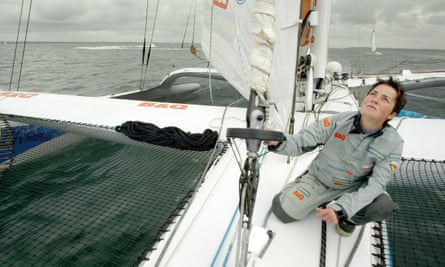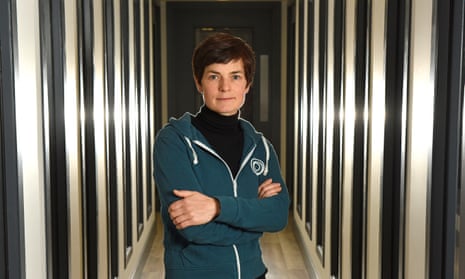Trophies from her past glories as a competitive yachtswoman are placed discreetly around the 16th-century building on the Isle of Wight, the base of Dame Ellen MacArthur’soperations today.
On a blackboard in one of the meeting rooms, the targets of a different passion are spelled out. From uncovering the scale of plastic pollution in the oceans to targeting the textile waste of the fashion industry, MacArthur, who in 2005 broke the solo record for sailing round the world, is dedicating her life to saving it.
Now 41, MacArthur dreamed of being a sailor aged four when living in landlocked Derbyshire, and saved up her school lunch money to buy her first dinghy.
The same single-minded drive to achieve her goals is clear in the way she tackles the dream that has consumed her since her early 30s: to help stop humanity using up the world’s finite resources. Indeed, it is unlikely her new passion would have emerged without the experience of her first.
“There were lots of subconscious things that happened that I was quite unaware of when I was racing; there were things I would write in the log,” says MacArthur. “I was racing round the world to try and beat the record, I was completely and utterly fully immersed in the record, I was thinking of nothing outside that … but every now and then I would write something down.
“I remember quite poignantly writing in the log on the boat; ‘What I have got on the boat is everything.’ It really struck me that you save everything, everything you have, because you know it’s finite, you know there isn’t any more. What you have on that boat is it, your entire world.”
Back on dry land, away from the intensity of racing, MacArthur began to process the thoughts she had on the water. Her newfound fame suddenly became an opportunity.
In the winter after the round-the-world race, MacArthur spent two weeks on an island in the Southern Ocean to film a programme about the albatross.
“It gave me time to reflect and it made me think even more deeply about resources,” she said. “You see the empty whaling stations down there and you realise that was just a resource – they pulled out 175,000 of them … and then there weren’t any to pull out.”
“The basis of my thinking was completely around resources. It was around the pure fact – stemming from what I had learned on the boat – that resources are finite. The more I learned, I just saw this as the greatest challenge I had ever come across. If we are using these resources in a very linear fashion we are going to use them up at some stage, and no one knows exactly when.”

MacArthur realised that if she was to capitalise on her moment of fame, her days as a competitive sailor would have to end.
MacArthur researched how best to move away from the disposable economic model to one in which resources are kept in use for as long as possible, then recovered and regenerated into other products and materials. She decided to dedicate herself to acting as a catalyst for change – a task that required her single-minded attention.
“It wasn’t like I was looking to stop sailing, I never thought I would stop sailing ever, ever, ever, no way,” she said. “I would have argued 10 years ago I would be racing in 20 years’ time. It was the hardest decision I have ever made to walk away, but I realised I was at a position in my life where doors had opened that I wasn’t expecting to open and I could use that ... that now was the time.”
Within two years of launching her foundation, MacArthur was presenting an analysis on the circular economy to the World Economic Forum. Seven years later, the team has grown from the yachtswoman and a couple of friends to a 100-strong staff on the Isle of Wight, where she lives with her partner and young baby. Today she still sails, but just as a hobby.
The foundation’s groundbreaking investigation into plastics produced shocking findings: 95% of plastic packaging material – worth $80-120bn each year – is lost to the economy after a single use, and after 40 years of recycling only 5% of plastic is recycled into a similar quality item.
Perhaps the most devastating statistic was the finding that if plastic leakage is not quenched, by 2050 the ocean will contain more plastic than fish by weight.
MacArthur believes it is through global partnerships and “incredibly frank conversations” with industry that change will naturally come by proving that more money can be made from circular rather than linear economics.
“We are trying to change a system, not one business. We need to change the way people think, the way things are designed, the materials that are put into them,” she said.
Her optimism is such that she believes change will happen through collaboration, and she has numerous leading companies, from Nike to Unilever, Google and Renault, as partners.
MacArthur is reticent about a more interventionist, polluter-pays approach, in which companies are forced to move to a less wasteful model through taxation, fines and charges.
“There are mechanisms to speed these things up, regulation or policy change,” is as far as she will go. Even with plastic packaging, the material which, according to her research, is part of a system that is the hardest to change, she shies away from punitive incentives.
MacArthur says some companies are getting on top of the issue – for example, Unilever, which has pledged to make all plastic packaging reusable, recyclable or compostable by 2025.
“It’s shocking, its horrendous, it’s getting worse not better … but this is a systemic failure and we are trying to go back to the beginning of the pipe and stop that systemic failure through redesigning the system,” she said.
“It is by working with these companies, with policy makers, with cities, with innovation to design bio-benign products – that we will tackle this. There isn’t a company out there which wants to see its logo in the ocean or in a river.”

Comments (…)
Sign in or create your Guardian account to join the discussion